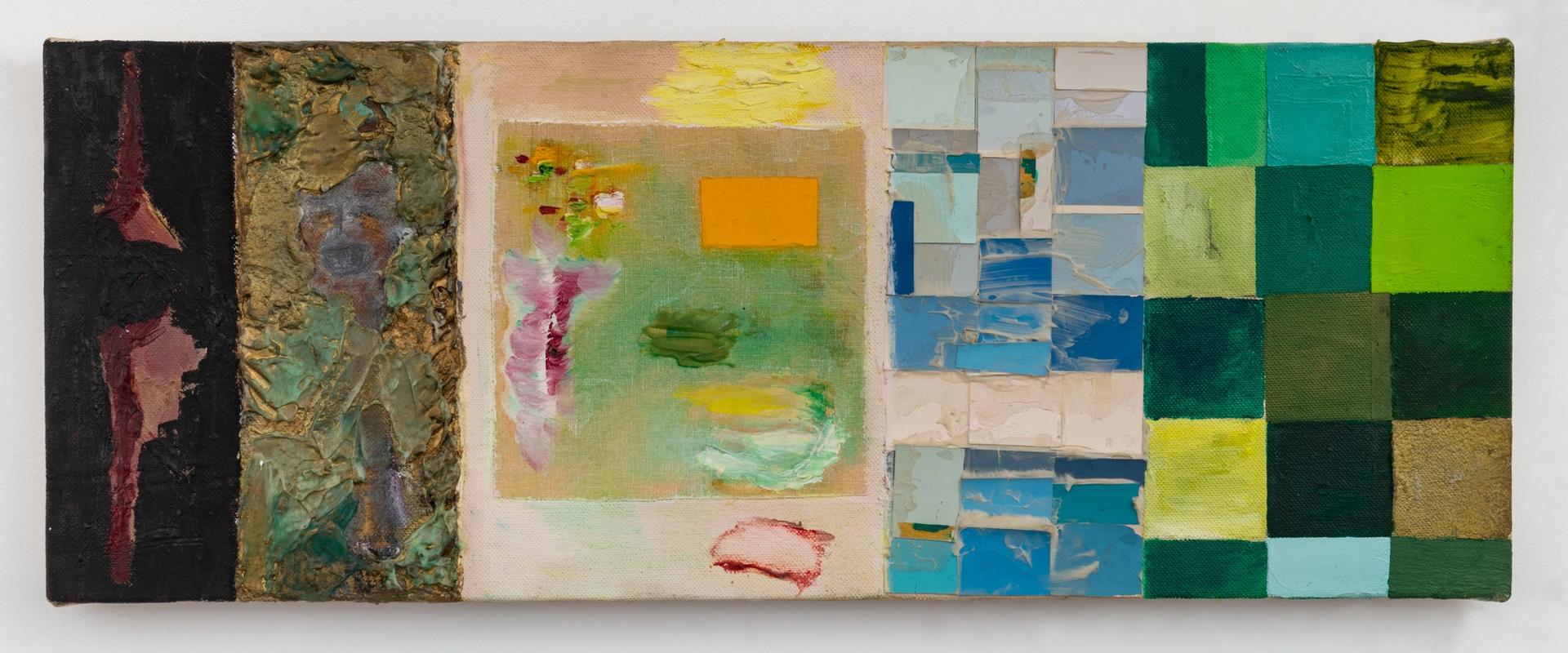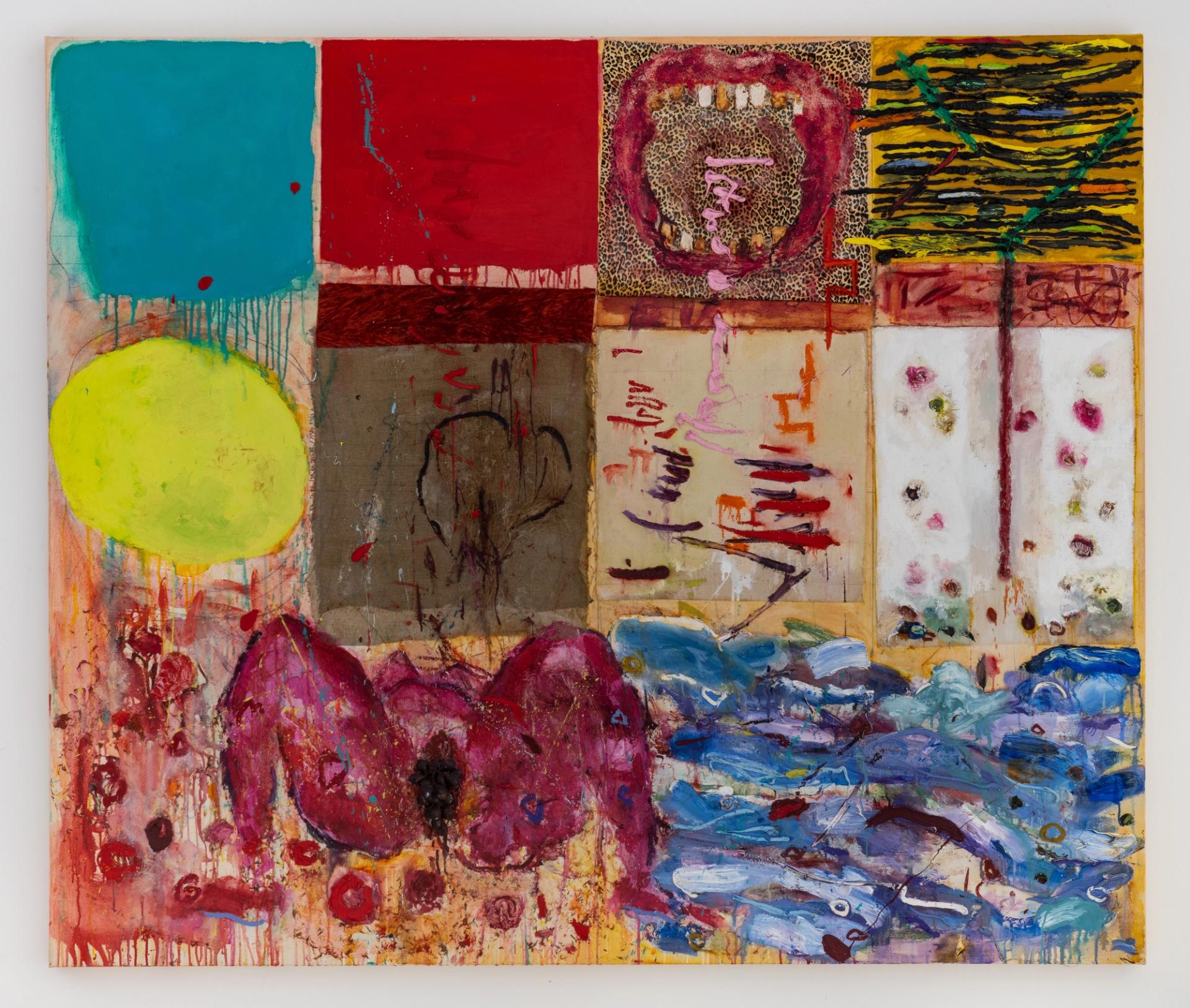Joan Snyder, who was described in Artforum in 1986 as a “cult phenomenon”, is one thing of an anomaly. The US painter, now 84, gained crucial acclaim early on in her profession, displaying in museums throughout the US from 1970 onwards, and has made a good residing promoting her work. However she continues to be thought-about an outsider within the UK and Europe, and has not been represented by a blue-chip gallery—till now.
Snyder nonetheless appears not sure of why that’s. “As a result of they didn’t like my work? As a result of they thought I’m a feminist?” she questions. The artist is talking within the workplaces at Thaddaeus Ropac gallery in London, the place her exhibition, Physique and Soul, opened final week (till 5 February 2025). The Austrian vendor took Snyder on in February, swiftly mounting this, her second main present within the UK; the primary was in 2019 with the now defunct Blain Southern gallery.
As a lady working by way of the male-heavy Summary Expressionist and Minimalist eras, Snyder considers herself one of many fortunate ones, even when blue-chip gallery illustration, and all the benefits that include that, remained elusive. “I all the time had galleries, I all the time made a superb residing, ranging from the Nineteen Seventies. It wasn’t for a scarcity of the work being very sellable. They simply didn’t need me,” she says. “I even knocked on some doorways”— however by no means the likes of Gagosian or David Zwirner: “I by no means pursued the massive 4 or 5, they all the time scared me.”
Joan Snyder, First Stroke Panorama (1968) Photograph: Adam Reich © Joan Snyder. Courtesy Thaddaeus Ropac gallery
The London exhibition charts the breadth of Snyder’s 60-year-long profession, which took off within the late Sixties with the event of her Stroke work—works consisting of brushstrokes distilled to their very essence. “The primary actually good portray I made, my actual breakthrough was in 1969 with Traces and Strokes,” Snyder remembers. “It was crystal clear precisely what I wished to do. It was easy, I used to be portray paint strokes. It was simply uncooked canvas, primed with rabbit pores and skin glue and a quite simple grid drawn with pencil. In some way it bought to the guts of all the things I’d been making an attempt to do all these years.”
These works earned Snyder a glowing status in addition to a protracted line of latest associates—although not all well-meaning. “There have been lots of people in my life, and I bought confused about who had been and who weren’t my associates,” she says. “There was large listing of people that wished the work, however I needed to transfer on.” The Stroke work had, Snyder says, turn into “too straightforward”.
She and her than husband, the photographer Larry Fink, purchased a farm in Pennsylvania, the place Snyder “remoted” herself and started to work on a brand new physique of labor that handled what the artist describes as “the entire idea of feminine sensibility”. Her work grew to become expressionist, in addition to autobiographical and political, incorporating supplies that started to protrude from the canvas: straw, rose petals, berries, mud and cloth. “In every single place I used to be seeing younger ladies being autobiographical, utilizing supplies, stitching, simply doing a number of various things that we hadn’t talked about, or we hadn’t seen,” Snyder says. “Feminism was working its means into my work in an enormous means, regardless that it was there within the mid-Sixties, but it surely actually got here again.”

Joan Snyder, Child Grand (1981) Photograph: Adam Reich © Joan Snyder. Courtesy Thaddaeus Ropac gallery
The private is political grew to become a rallying cry for feminists within the Sixties and for Snyder, the private has all the time bubbled slightly below the floor of her canvases—in some extra overtly than in others. The rose has been a recurring motif, together with in a few of the eight new works on present in London, however the artist is much less concerned about divulging any specific that means, pointing as an alternative to the Latin phrase “sub rosa”, that means beneath the rose: in historic occasions, a rose hung over a council desk denoted secrecy or confidentiality. With Snyder, that means shouldn’t be simply provided up, however slightly will get intentionally left behind.
In direction of the tip of the Nineteen Seventies, Snyder had an abortion, a miscarriage and a child (her daughter Molly) throughout the house of three years. “I had an abortion, then I so regretted it, then I bought pregnant once more instantly and I had a miscarriage after about 5 or 6 months, that was throughout early April,” Snyder says. For many years after, the artist made large work in early April about shedding that child, a child boy to have been named Oliver.
Ladies’s rights—reproductive, inheritance rights, ladies’s wrestle in opposition to abuse—are in some ways current in Snyder’s work. She shakes her head on the present political state of affairs within the US and says quietly, “It’s a shit present.” Snyder thinks many ladies will likely be “actually badly” affected by Donald Trump’s presidency: “Ladies being deported. Ladies being separated from their kids and households. Ladies who’re in disaster and would possibly want medical assist. Ladies who’re raped and need to undergo a being pregnant.”

Physique & Soul (1997-98) Photograph: Adam Reich © Joan Snyder. Courtesy Thaddaeus Ropac gallery
After having Molly in New York in 1979, Snyder left town over rising fears for her daughter’s security after a toddler was kidnapped close to the place they had been residing on Mulberry Road. They moved to slightly home surrounded by bean fields in Eastport, on the south shore of Lengthy Island, which impressed Snyder to begin portray landscapes within the fashion of her Stroke footage. “I made bean discipline with snow, bean discipline with music, bean discipline with mud. After which, apparently sufficient, the farmer who owned the bean fields had a stroke and so they grew to become weed fields, however they had been so stunning. These fields filled with wildflowers,” she says.
Maybe surprisingly, Snyder thinks of herself as a panorama painter first—although her landscapes usually learn as figures and vice versa. She recollects, as a younger painter, listening to Frank Stella saying he would by no means put a determine in his work. “It impressed me to say I’d all the time put a determine in my portray,” she says. “Who would make a press release like that? With all due respect, and I like a few of Frank Stella’s work, however that was such a blatant assertion, it dismissed a variety of artists.”
In the present day, Snyder’s studio is stuffed with the remnants and symbols of panorama—dried flowers, petals, straw, mud, berries and rosebuds. She moved again to New York Metropolis within the mid-Eighties, the place she met her now spouse Margaret Cammer, a retired decide.
These remnants have brought on critics and writers to liken her studio to a witch’s den—an analogy that Snyder says amuses her. However there’s a distinctly non secular, alchemical side to her work and Snyder herself has spoken about being at an altar when she paints. “It’s the altar I’m going to face myself,” she has mentioned. “Artwork grew to become a type of worship. These had been my shrines.”
In 1992, Snyder wrote an essay, “It Wasn’t Neo to Us”, prompted by the then rising phenomenon of neo-Expressionism, which was largely written about as a brand new style invented by male artists resembling Julian Schnabel, David Salle and Eric Fischl. Snyder identified that artists together with Nancy Spero, Religion Ringgold, Jackie Winsor and her had been bringing expression and the private into their artwork lengthy earlier than—besides they had been known as feminists.
The textual content requested if something had modified for ladies artists over the previous 20 years. “Are we nonetheless discriminated in opposition to by curators, critics, and sellers? Can we nonetheless must have ladies’s reveals?” Snyder requested.
The identical questions may nonetheless be mentioned to be legitimate as we speak. Snyder thinks there was quite a lot of progress because the Nineteen Seventies however says there’s nonetheless a glass ceiling for ladies artists. “We’re very removed from being thought-about equals—not less than I’m—to male painters within the artwork world. I don’t suppose there’s equality. Ladies are nonetheless struggling to maintain up or to be correctly recognised or accepted. To not point out getting retrospectives and equal gross sales costs.” It appears issues could possibly be about to vary for Snyder.





















